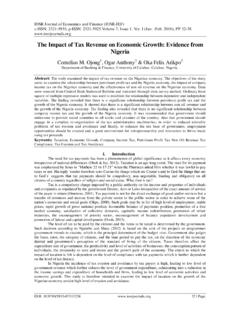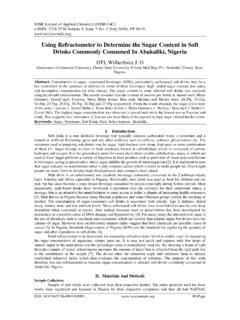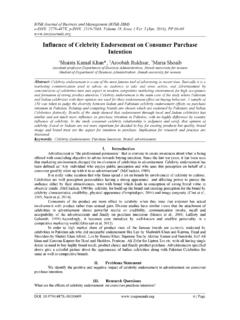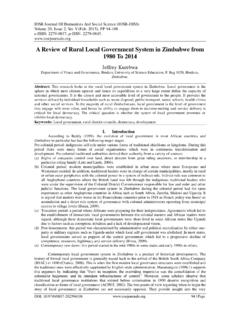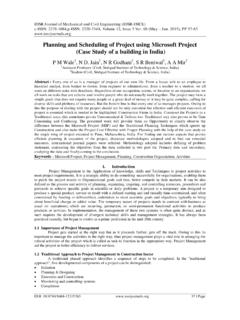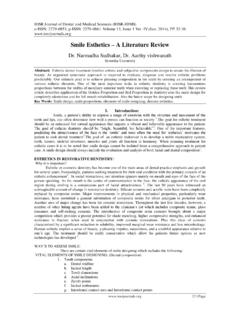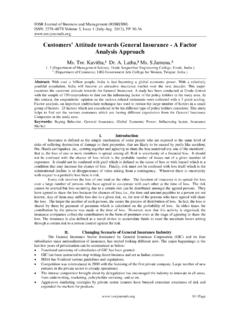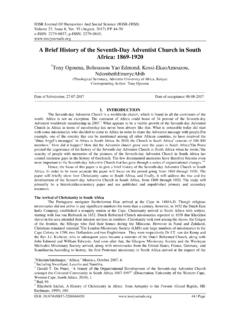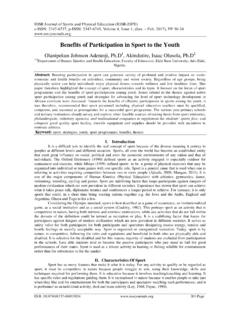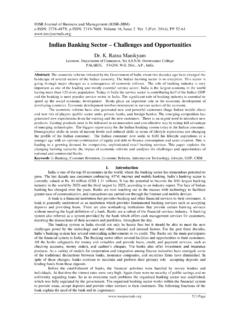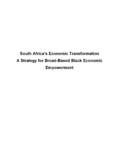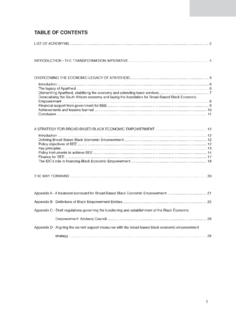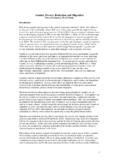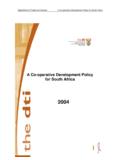Transcription of The Consequences of Implementing the …
1 IOSR Journal of Business and Management (IOSR-JBM) e-ISSN: 2278-487X, p-ISSN: 2319-7668. Volume 17, Issue 11 .Ver. I (Nov. 2015), PP 55-57 DOI: 55 | Page The Consequences of Implementing the Indigenisation and economic empowerment Policy Framework on the Banking Sector in Zimbabwe Amos Tendai Munzara Lecturer, Faculty of Commerce and Law, Zimbabwe Open University, Harare, Zimbabwe Abstract: The paper discusses the Consequences of Implementing the indigenisation laws in their current form on the banking sector in Zimbabwe. The law requires that firms operating in the country which are owned by non-indigenous Zimbabweans and with asset values exceeding US$500 000 cede 51% shareholding to indigenous black Zimbabweans. The paper concludes that the benefits of indigenising foreign banks are far outweighed by possible negative Consequences .
2 These Consequences include loss of confidence in the banking system, loss of lines of credit, loss of access to latest technologies, and as well as limited exposure to international best practices. The programme may lead to foreign banks disinvesting from the country with serious repercussions to the economy. The indigenisation of foreign banks should therefore be approached with caution so that the indigenised banks would at least retain their international appeal with the foreign partners retaining influence on important decisions affecting the operations of the banks. Key words: indigenisation, foreign bank, shareholder, liquidity crunch I. Introduction The Indigenisation and economic empowerment Act was enacted into law on April 17 2008.
3 The major objective of the law is to dilute foreign domination of the Zimbabwean economy by empowering the previously disadvantaged indigenous black Zimbabweans to fully and meaningfully participate in mainstream economic activities. The law requires that firms operating in the country which are owned by non-indigenous Zimbabweans and with asset values exceeding US$500 000 cede 51% shareholding to indigenous black Zimbabweans. While the objective of the law is understandable, there are concerns regarding the high local ownership threshold which effectively robs foreign investors of controlling interests in any venture established in Zimbabwe. This paper discusses the Consequences of Implementing the indigenisation laws in their current form in Zimbabwe s banking sector, that is, the effect of transferring majority shareholding in foreign banks to indigenous Zimbabweans II.
4 Intended Benefits of Indigenising Foreign Owned Banks The banking industry is considered by the government as a strategic industry. In order to gain control over this strategic industry, the government hopes to increase participation of indigenous people in the banking sector through the indigenisation laws. It is hoped that this in turn would improve access to credit for indigenous businesses and priority sectors of the economy. There is a perception by government that foreign owned banks discriminate against indigenous businesses in the allocation of loans, and that they are failing to finance the developmental needs of the country, for example, funding agriculture. It is hoped that one of the positive effects of the indigenisation laws is to enable government to effectively regulate the direction of bank credit.
5 Brownbridge (2012) observes that locally controlled banks are generally more willing to extend credit to the public sector, locally owned businesses and to priority sectors of the economy. However, the current framework of the indigenisation policy is not properly tailored to the banking sector such that if implemented in its current form it may result in outcomes which are at variance with the intended goals. III. Negative Consequences of Indigenising Foreign Banks The Consequences of Implementing the current indigenisation and empowerment framework on the banking sector in Zimbabwe have to be inferred in light of the fact that foreign banks are systematically important institutions in our economy. Gono (2013), defines a systemically important institution as an institution whose size, complexity, scale of operations and connectedness to the local and foreign financial and other economic systems is such that an event within or surrounding that institution would have far reaching implications for other institutions and economic sectors within a given jurisdiction.
6 Some of the adverse effects of Implementing the current framework are as follows: The Consequences of Implementing the Indigenisation and economic empowerment DOI: 56 | Page Loss of Customer Confidence Foreign banks would lose their international appeal and in turn the banking public might lose confidence in the indigenised foreign banks. As public trust in banks evaporates, depositors will pull their funds out of banks and hide them under the proverbial mattress, sending the banking system into severe disintermediation (McCoy, 2007). The mere fact that a local bank is a subsidiary of a reputable international bank fosters customer confidence in the bank. It is regrettable that people in Zimbabwe have lost confidence in local banks due to poor corporate governance associated with them which often result in abuse of depositor funds.
7 For as long as the public have no confidence in banks money will continue to circulate outside the banking system. The Reserve Bank of Zimbabwe estimates that over US $3 billion is currently circulating outside the banking system. This has the effect of nurturing opportunities for money laundering and terrorism. Loss of Lines of Credit Indigenisation of foreign banks would lead to loss of access to external lines of credit. Foreign banks are arguably better placed to mobilise international financial resources compared to local banks. Lines of credit and financial support from donor organisations and international financers such as the IMF and World Bank are usually channelled into recipient countries through international banks. Absence of lines of credit has the effect of starving the productive sectors of the economy of the much needed foreign capital inflows.
8 A related problem, according to Gono (2013), is that of the disruption of formal channels through which diaspora remittances find their way into the country further worsening the liquidity crunch currently bedevilling the economy. Loss of Access to Latest Technology It is envisaged that indigenisation of foreign banks would likely result in loss of access to latest technologies. Local banking institutions whose parent companies are international banks are better placed to adopt latest advanced technologies compared to indigenous banks. Technological innovations such as the use of smart cards, ATMs and e-banking were first introduced in Zimbabwe by international banks. Emerging technologies have changed the banking industry from paper and branch based banks to digitised and networked banking services (Ramey, 2012).
9 For example, e-banking enables customers to access their bank details on their own personal computers; effect money transfers from one account to another; print bank statements and to inquire about their financial transactions. Loss of a Recognised Brand Another negative consequence of indigenising foreign banks is the loss of a recognised brand network. A very strong brand can help a bank to boost its market share and goodwill among other investors and hence its profitability. According to Mehtani (2010), the key to acquiring and retaining customers in order to maintain long term profitability and competitive edge lies in creating and maintaining a favourable brand image in the minds of the target customers . Indigenisation of foreign banks would dilute or completely erode the strong, trusted and highly recognisable brands associated with foreign banks.
10 The indigenised foreign banks are likely to discard their current names a situation which makes it extremely difficult to retain the brand equity that they enjoyed prior to indigenisation. Gono (2013) argues that in the event of indigenisation, foreign banks will not want their names or logos associated with banks that they do not have power to influence in terms of business methods, decisions and direction. Loss of Training and Exposure to International Best Practices The implementation of the current indigenisation framework may also result in staffers in the indigenised banks losing opportunities for training and exposure to international best practices. The Growth Commission Report of the World Bank observes that entry of foreign banks into the local banking sector brings expertise and help to strengthen domestic banks through the transfer of technology and best practices.
